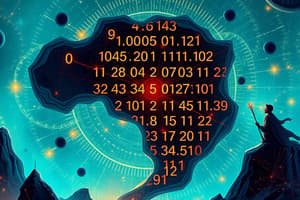Podcast
Questions and Answers
What role does logical thinking play in identifying number sequences?
What role does logical thinking play in identifying number sequences?
- Memorizing the sequence
- Randomly guessing the next term
- Calculating the sum of the sequence
- Establishing incremental relationships (correct)
In a geometric sequence, what remains constant between consecutive terms?
In a geometric sequence, what remains constant between consecutive terms?
- The position of the terms
- The sum of the terms
- The difference between the terms
- The ratios between the terms (correct)
Why is it important to understand the ratio relation in a geometric sequence?
Why is it important to understand the ratio relation in a geometric sequence?
- To change the position of the terms
- To memorize all the terms
- To skip calculating all preceding members (correct)
- To rearrange the sequence
What is essential for successful analytical techniques according to the text?
What is essential for successful analytical techniques according to the text?
How does logic help in interpreting abstract concepts?
How does logic help in interpreting abstract concepts?
Why is cultivating critical thinking skills considered indispensable?
Why is cultivating critical thinking skills considered indispensable?
What are natural numbers?
What are natural numbers?
In the sequence 1, 2, 3,..., what type of logical reasoning is involved?
In the sequence 1, 2, 3,..., what type of logical reasoning is involved?
What characterizes an arithmetic sequence?
What characterizes an arithmetic sequence?
If an arithmetic sequence goes 5, 8, 11,..., what would the next term be?
If an arithmetic sequence goes 5, 8, 11,..., what would the next term be?
What formula is used to find the next term in an arithmetic sequence?
What formula is used to find the next term in an arithmetic sequence?
In an arithmetic sequence, what happens to consecutive terms?
In an arithmetic sequence, what happens to consecutive terms?
Flashcards are hidden until you start studying
Study Notes
Discovering Patterns through Number Sequences
Exploring number patterns is much like deciphering a secret code – revealing intriguing connections among seemingly unrelated numbers one step at a time. As you delve into these fascinating sequential puzzles, we'll utilize our ability to reason logically, teasing out hidden formulas from numerical strings.
Natural Numbers and Order
Let's begin by looking at natural numbers, which consist of positive integers beginning with 1 – {1, 2, 3...}. When arranging natural numbers in sequence, order matters; a common example includes counting upwards where each successive term increases by one unit: 1, 2, 3, .... In this context, logical reasoning involves recognizing when terms follow predictable increments such as addition (+1), multiplication (*2) or other mathematical operations.
Arithmetic Sequences
One well-known type of number pattern is called an arithmetic sequence, characterized by differences between consecutive terms remaining constant throughout the series. For instance, consider the sequence 5, 8, 11, 14... Each difference between adjacent terms equals +3, so any additional term can be found by adding 3 to its predecessor: (n = n_{i} + d). This formula provides a valuable tool for determining unknown elements within an established pattern.
Logical thinking comes into play here because it helps us identify whether a given sequence fits this mold based upon observed incremental relationships rather than memorization alone. By examining differences between consecutive terms within a set of numbers, we establish whether the sequence conforms to the criteria defining an arithmetic progression.
Geometric Sequences
Another important concept is geometric sequences, wherein ratios between consecutive terms remain constant regardless of their position within the sequence. To illustrate, let's look at the sequence 1, 2, 4, 8.... Here, every succeeding term represents twice the value of its immediate precursor (( \frac{t_n}{t_{n - 1}} = r )). Solving this ratio equation allows us to find specific values within the series without having to calculate all preceding members individually.
The importance of logic lies in recognizing how this ratio relation remains invariant throughout the entire sequence, enabling us to discern if a particular string follows the rules of a geometric series. Without understanding the underlying principle, merely listing off terms may lead us astray.
Recognition and Formulation
As discussed above, successful analytical techniques focus more on identifying essential characteristics than rote recitation of individual items in a sequence. Logic drives intuitive interpretation of abstract concepts and facilitates spotting distinctive features within the data presented. Once recognized, these distinguishing traits serve as building blocks towards developing concrete expressions like those encountered earlier.
Ultimately, cultivating critical thinking skills plays an indispensable role in comprehending fundamental properties inherent to various types of number sequences, unlocking fathomless realms of mathematics and promoting intellectual growth.
Studying That Suits You
Use AI to generate personalized quizzes and flashcards to suit your learning preferences.




